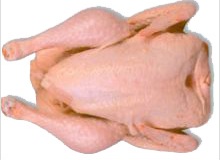Broiler carcass cleansing Solution removes harmful bacteria

Using a cleansing solution to wash eviscerated chicken carcasses was effective in removing bacteria that cause human foodborne diseases, according to a study by Agricultural Research Service scientists.
The findings provide data that may be useful to poultry producers in designing practical, non-chlorine-based sanitizers. The cleanser, which is composed of lauric acid and potassium hydroxide, could be used to sanitise chicken carcasses during processing prior to chilling. Since other countries do not use chlorine rinses, ARS is looking at alternatives for them and is evaluating the most effective rinses against foodborne pathogens in poultry.
The studies were done by ARS microbiologist Arthur Hinton, Jr., and physiologists John Cason and R. Jeff Buhr at the Richard B. Russell Research Center in Athens, Ga. They conducted a series of studies to determine the best way to use mixtures of lauric acid and potassium hydroxide to sanitise poultry carcasses.
In the first set of studies, carcasses were spray-washed with different concentrations of the lauric acid-potassium hydroxide combination. Results showed that increasing the concentration of lauric acid to 2% and potassium hydroxide to 1% of the solution generally removed more bacteria from the broiler carcass. That means that the concentration of the cleanser is an important consideration when utilising it as a sanitiser.
In another series of studies, Hinton and his colleagues used varying spray pressures (60, 100 and 150 pounds per square inch) and found that pressure did not have a significant effect on reducing bacterial contamination.
Later, however, the researchers examined the effect of time on the ability of the spray-washing to reduce bacterial contamination of carcasses. Hinton found that increasing the amount of time the carcasses were sprayed from 5 to 15 or 30 seconds resulted in significantly reduced bacterial contamination.
The research was published in the International Journal of Poultry Science.
Source: US Department of Agriculture’s Agricultural Research Service












